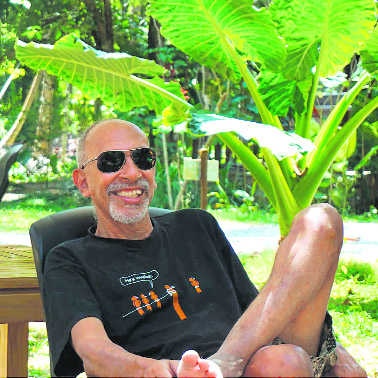
Charitable act: The wildlife biologist, who played an important role in environmental conservation in India, was a philanthropist as well. Awarded $ 25,000 for the St Andrews prize for Environment in 2011, he gave it all to a Tsunami-hit Nicobar community Photo courtesy: Speaking Tiger
Lt-Gen Baljit Singh (retd)
Rauf Ali was born in a family of privilege with proclivity for intellectual, natural history pursuits. As a child he often saw a reclusive man “who lived in a room just packed with books....there were tables...again stacked with piles of books...In the middle...the old man could always be found. This was Salim Ali, my grandmother’s brother. He wrote books on birds.” Rauf’s uncle, Humayun Abdulali, was another authority on Indian birds, perhaps a notch higher than Salim Ali.
Rauf would spend several school vacations as a field hand at Salim Ali’s annual camps in the Bharatpur marshes and witness the sight and listen to the symphony of Siberian cranes in their hundreds, before they passed into extinction. It is not surprising, therefore, that when Rauf “finished school....there were five wildlife months that followed”. He flew to Bhuj to observe roosts of larks in thousands, herds of chinkara antelopes in hundreds, dense congregations of common and demoiselle cranes, the magic moments of outdoors India which have vanished forever. He would wind up, spending two months on the lakes of Srinagar Valley and the uplands of Dachigam sanctuary sampling ample sightings of rosefinchs, hangul stags and black bear.
On finishing with college at BITS, Pilani (Rajasthan), Rauf registered for a Ph.D in birdsong at Bristol University, UK, but a British naturalist in Cambridge persuaded Rauf to take up research on primates in India, instead. Understandably, Rauf’s reaction was, “But I don’t know anything about monkeys!”
“All the better for you. You will start with an uncluttered mind”.
Rauf shares a nail-biting episode on day one of behavioural biology research of bonnet macaques, at a locale which is presently the Kalakad-Mundanthurai Tiger Reserve, “The path I followed reached a little stream....It then curved up, going diagonally across the hill face.....The fog had thickened and made it difficult to see more than a few metres ahead....Suddenly a great grey shape loomed out of the mist in front of me, trumpeting. I leapt off the path, lost my footing and went stumbling.....The grey shape rapidly resolved itself into an elephant....An adrenalin rush like I’d never experienced before hit me. I sat huddled for an hour....”
Two years post the elephant encounter in 1976, Rauf had not only earned his Ph.D on bonnet macaques but in the process had also researched the living biology of all five primate species found in South India; the Hanuman langur, Nilgiri langur, lion-tailed macaque, black macaque and the slender loris. But despite his outstanding academic accomplishments or because of it, Rauf simply could not adapt to any straight-jacketed teaching or office-bound appointments; often resigning soon or being asked to do so. But in his individual capacity, he would inspire and supervise, at least a dozen young Indians to earn doctorates on objects such as the Malabar giant squirrel, butterflies, gaurs and so on. He talks about his field assistant, G Narayanaraj, son of a Kalakad forest guard, who would in time “among other things, acquired two Masters degrees, got a doctorate, been a teaching fellow at Harvard University and worked at the Audubon Society”.
In time, Rauf emerged as a runner-up for the prestigious St Andrews prize for Environment in 2011 and was awarded $ 25,000. He promptly invested the entire sum to empower the Tsunami-hit Great Nicobar community by getting manufactured a hydraulic device for extracting virgin coconut oil, with a potential of Rs 2.25 crore earnings each month. It was successfully installed, handed over to the Nicobari Women’s Cooperative and functioned to envisioned capacity. But the coconuts buyers syndicate, operating from Chennai, sabotaged the initiative by buying back and decommissioning the machine for a paltry sum.
On the inner flap of the dust jacket is a portrait of Rauf and imprinted on the T shirt, looking up at Rauf is a bird with her brood of four and a precocious one declares “He’s Wingless!” Rauf was perhaps amused of how birds look at man! RIP Rauf.



























